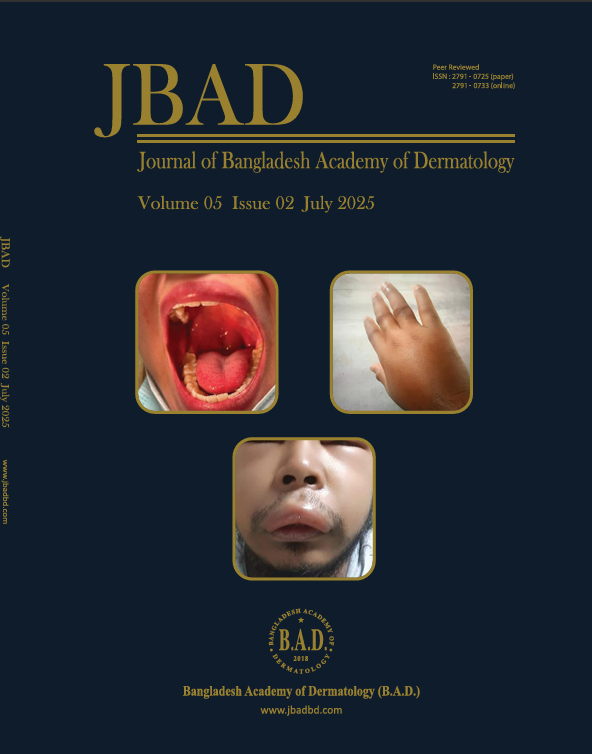Original Article
Novel Messenger RNA Coronavirus Vaccination: A Study of Adverse Skin Reactions
Author Details
1. Junior consultant, Department of Dermatology, Government Employee Hospital, Dhaka, E-mail: farhana.wahab80@gmail.com
2. Senior Lecturer, Department of Social Relations, East West University, Email: drmarzia.sultana@ewubd.edu
3. Junior Consultant, Department of Dermatology, Shaheed Ahsan Ullah Master General Hospital,Tongi,Gazipur, Email: muraddr28@gmail.com
4. Senior consultant, Department of Dermatology, Kuwait Bangladesh friend ship govt hospital, Uttara, Dhaka, Email: tabindaa90@gmail.com
5. Junior Consultant, Department of Dermatology Kuwait Bangladesh friendship government Hospital, Email:mohshena1982@gmail.com
6. Medical Officer, Kuwait Bangladesh Friendship Govt. Hospital, Dhaka, Email: tanuvak53@gmail.com
7. Assistant Registrar, Dermatology, TMSS Medical College, Bogura, Email: drshanto2818@gmail.com
Abstract Background: Anecdotal reports regarding novel formulations of messenger RNA (mRNA)-based vaccines are being inflated by social media, generating alarming misconceptions about vaccination. Objectives: To evaluate the morphology and timing of cutaneous reactions after messenger RNA virus vaccination and to calculate the number and frequency of each of those eruptions. Methods: This prospective observational study was conducted on a total of 183 people who reported cutaneous reactions after vaccination with Food and Drug Administration-approved Pfizer or Moderna mRNA vaccines, at Kuwait Bangladesh Friendship Government Hospital, Dhaka. Statistical analyses were done by using SPSS 26 and descriptive analysis and association of variables were seen by frequency distribution and Chi-square analysis with p-value ≤0.005. Results: Adverse skin eruption was found among 60.7% of study participants after the booster dose, among 31.1% of participants after 2nd dose and only among 8.2% of participants after 1st dose. The latency between gettng vaccine and onset of skin eruption was <7 days among 29.5% of Conclusion: The low rate of reactions and favourable course observed in our study would be helpful to reassure patients as well as healthcare providers that the vaccination program is safe and affordable even in allergic patients. Keyword: Corona virus, vaccination, mRNA vaccine, skin reactions. |
Keywords: Corona Virus, Vaccination, Mrna Vaccine, Skin Reactions

